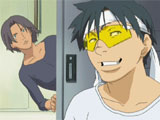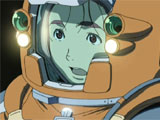

Quick Links:
Planetes
As an admirer of realism within fiction, and a student of the philosophy that imagination should be balanced with reality, I have come to find Planetes one of the most engaging and satisfying animated titles in years. This is a title that eschews formulaic anime troupes such as maids, ninjas (save for one episode), super robots, and magical girls for a story that is at once both epic and human.
Epic stories are a dime a dozen when it comes to anime. Epic stories which take place in the future, in outer space, with political intrigue are just as typical. Any anime fan knows Gundam is the godfather of political space epics. And like Gundam, Planetes features all of the above. Unlike Gundam, there are no super robots, no atomic colonies, and no beam rifles to worry about. There is no rebellion that sparks the basis of the story. No giant alien race is threatening to invade with superior firepower. No, for Planetes, the trouble all begins with a single, run-of-the-mill screw, whirling through space.
In outer space, friction is at an all-time low. As in, non-existent. Thus any small part, such as our sample screw, can be a hazard to space travellers. This is quickly demonstrated when the screw strikes and cracks the window of a passenger craft in orbit, killing most of the occupants aboard. It's a tragic note to open upon, but gives the world reason to create an all-new industry in the galaxy: cosmic garbage collection.
Enter our 'heroes', who work in the debris collection department known as "Half Section" (because they only have half the regular staff count). We begin with Hachimaki, a headstrong, loudmouthed debris collector who fights with his little brother at the drop of a hat, doesn't like surprises, and is about as kind as a kick to the head with most people he meets. But he's not all bad. He's a hard worker and can grow to like a person just fine, as long as they don't rag on about his life. Hachimaki's dream is to buy his own spaceship, but being a debris collector just doesn't pay the bills.
Our second hero, or heroine in this case, is Fee. She smokes, she shouts, she smokes, she leads the team, she smokes, and did I mention she smokes? Yes, Fee is the high-strung captain of the team. While in theory her power is limited to just commanding the spaceship "Toy Box," no one in the office dares go against her orders when she's made a decision. To resist would result in a fate worse than death. In fact, merely to deprive her of her cigarettes results in such.
Thirdly, we have Yuri. Yuri's motivations for being a debris collector are rather mysterious. Although quiet, he's generally pleasant and always helpful. He doesn't really say much, but his actions speak louder than words. Still, there must be a reason he's working where he is, if only he'd open up about it.
Then we have Tanabe, the new girl. She's happy, ready to put herself to any test, anywhere. She's got a real go-getter attitude and works well with others. If only those others didn't include Hachimaki. These two fight endlessly, with most of their conflicts pitting Hachimaki's cynicism duelling against Tanabe's optimism. The relationship is nothing short of volatile early on, though the dynamic begins to change as they learn about each other's pasts.
After these four stellar individuals, there's the manager, the vice manager, and the secretary. They don't go out on Toy Box much, preferring middle-management in the office. The manager eats all day and worries about being fired before getting to retire. The vice manager clowns around all day and worries about being fired before getting a promotion. And Edel the secretary? No one knows what she does outside of the office, but she's as punctual as clockwork.
The series has three major strengths. The first is characterisation. Through both the aforementioned main cast as well as their supporting characters, every episode brings something special to the table. There's a real chemistry that bleeds through their basic formats, from Hachimaki and Tanabe's arguments to Fee's work stress and Yuri's secret pathos. As each character's conflicts come to light, the viewer is drawn more and more into their world, until they stand almost as real as a friend next door.
In many ways, this makes Planetes a slice-of-life story. Much of the plot is driven by character interaction and upset, rather than external circumstance. And even when the world has it in for a particular character, there's a genuine response. Some things aren't resolved. Not everything has a happy ending. In fact, there's a lot of tragedy in Planetes. But it's not the sort of bloody, gut-wrenching tragedy one might expect from a melodrama like X or Gundam. This is a very human drama dealing with issues close to home. War, sex, and violence are all in the background. Occasionally they drop by and mess things up for the crew, but they don't devour things wholesale.
So, there's not much war. There's little more than a footnote on sex. Drugs aren't playing centre stage. And rock and roll? This is 2075. Rock and roll is classical music. What's the draw to Planetes? Perhaps it's the care with which everything in its universe is moulded. This is a story we could live in only a few years. If we remove the characters from their technology, it's a story we can live right now. But the technology makes things just that one step departed from where we are. It has orbital stations, spaceships, zero gravity training, centrifugal-generated gravity, and fancy displays on all the cool computer gadgets.
Second in its strengths, it's not Star Trek. This isn't an idyllic future where everyone lives in peace and harmony. And despite the fact the story isn't taken over by war, there are constant international and wartime issues lingering in the background, especially concerning a large political body called INTO. Although the characters aren't directly involved, the viewer gets the sense that there is a much larger world working outside of the primary scope. There's constant mention of countries that have gotten the short end of the stick through INTO's military campaigning, how various people have been affected by the political climate, and makes sure the viewer understands that things aren't black and white in the world picture, even in 2075. It brings the fiction closer to reality, making it seem like the events are something we ourselves would read in the morning newspaper. There may be heroes out there, but we aren't hearing about them.
The third strength is in the detail of the actual animation. This series is gorgeous. In the spirit of Wings of Honneamise and Patlabor, Planetes features some of the most detailed and realistic animation available today, and in a TV series at that. It's not often that a television show can stack up to motion pictures, but while maintaining the feel that it belongs on TV, Planetes also conveys a level of realism few people would expect from anything on the silver screen.
The creators of the series worked closely with NASA for specifics on machinery designs and how zero-gravity would affect various elements of the series. All the hard work certainly paid off, giving us elements that, while fictional, are completely believable. There's no super-science to groan about, no magic reactors which enable faster-than-light travel. This is all about pitch, angle, and acceleration. Even the slightest adjustment off and a spacecraft can wind up on a collision course with an NBC satellite. It's a dangerous world in orbit, and Planetes shows just how lethal things can get.
At the same time, Planetes never takes itself so seriously that it becomes nothing more that a technical display piece. As I mentioned, characters play the largest role in projecting what the series is about. The technology works very much with them, and is never taken as something external to their lives. In series like Gundam, there's often a 'wow' effect associated with new developments in weaponry and the like. For the characters in Planetes, the wow effect is almost a footnote. It's like opening a magazine and seeing the latest laptop someone brought out. It's awesome, but let's face it, it doesn't (hopefully) take over your world.
It's refreshing in fact to find a series where the technology lives with the characters. It's never 'explained'. In this sense, it's comparable to Ghost in the Shell: Stand Alone Complex. A specific piece of technology may be explained, but there's a general air that the environment is a backdrop to the characters. They aren't standing around marvelling at things (although Tanabe does do this once in awhile, but mostly because she's a rookie), they're getting on with their lives.
Summarily, Planetes is a drama. It's not a space drama, or a melodrama. Just a drama. It's easy to watch, easy to love, and gorgeous to look at. I have to say that personally, I have never seen such a gorgeous TV production before. It outclasses most OVAs I've seen and can give more than half the anime movies out there a run for their money. What's more is, the characters and their struggles are close to home, from the anger to the laughter. It's a show that, when it wins you over, keeps you forever. A real masterpiece of the industry.
Distributor: Bandai Entertainment Creator: Bandai Visual, Sunrise, NHK / Manga by Yukimura Makoto Released: 2005
Video Quality: A+ Audio Quality: B Presentation: A+ Content: A+ Overall: A+



